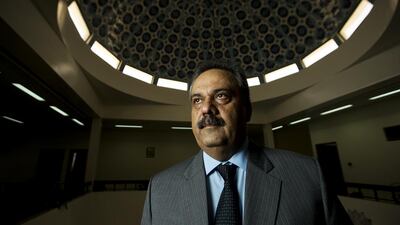ABU DHABI // Asif Durrani, the Pakistani ambassador, has called for solemn celebrations for Pakistan Independence Day on Thursday to respect those suffering from continuing conflict there.
In June, the Pakistani military launched Operation Zarb-e-Azb to drive armed militants out of the North Waziristan region.
Masses of people have become refugees from the fighting and Mr Durrani said they should be remembered during Thursday’s celebrations.
“This year, the government aims to celebrate with all solemnity but at the same time we should also remember the plight of our 800,000 people who have been temporarily dislocated from North Waziristan,” he said.
Mr Durrani also appealed to the Pakistani community to donate to help the displaced of their country.
He will be marking his first Independence Day in the UAE, as he took up the post in February, and has applauded the contribution of community so far.
“The Pakistani diaspora in the UAE are wonderful, hard-working people and we are proud of them,” Mr Durrani said. “Their services have been duly acknowledged by our brothers in the UAE.
“The community has toiled in this country and earned a good name.”
Despite this, he said many children of Pakistani expatriates were not getting sufficient education.
“With 1.3 million people here, a second and third generation of Pakistanis are now living in the UAE.
“They have problems with education for their children, especially higher education, and we have not been able to cope with growing demand.
“Hence we are trying our best to not only improve the standard of our schools in the UAE, but also expanding these schools. And if needed, we may strive to open new schools as well as colleges in UAE.”
There are nine schools run by the embassy of Pakistan, including two in Abu Dhabi and one in Al Ain.
The consulate in Dubai takes care of the other six schools, in Dubai and the Northern Emirates.
Improving trade relations between Pakistan and the UAE is another important priority for Mr Durrani.
“At present our volume of trade is US$9 billion [Dh33.05bn], of which $6bn is UAE exports and $3bn is Pakistani exports to the UAE,” he said.
“My efforts will be to enhance investment in Pakistan and my focus will be meeting prospective investors.
“The UAE has invested $25bn in Pakistan and so far Pakistanis have invested around $23bn in the UAE, which includes real estate, industry and other businesses.”
Mr Durrani said the people of Pakistan had much respect for the people of the UAE and its leaders, and were grateful for the humanitarian help the country had received from them.
“We very much appreciate the positive contribution of UAE in assisting Pakistan during disasters such as 2005 earthquake and the floods in 2010 to 2011,” he said.
“More recently the UAE has contributed and assisted Pakistan for eradication of polio.
“Almost 4 million children have been given polio shots with the assistance of UAE. We are grateful for that.”
akhaishgi@thenational.ae

